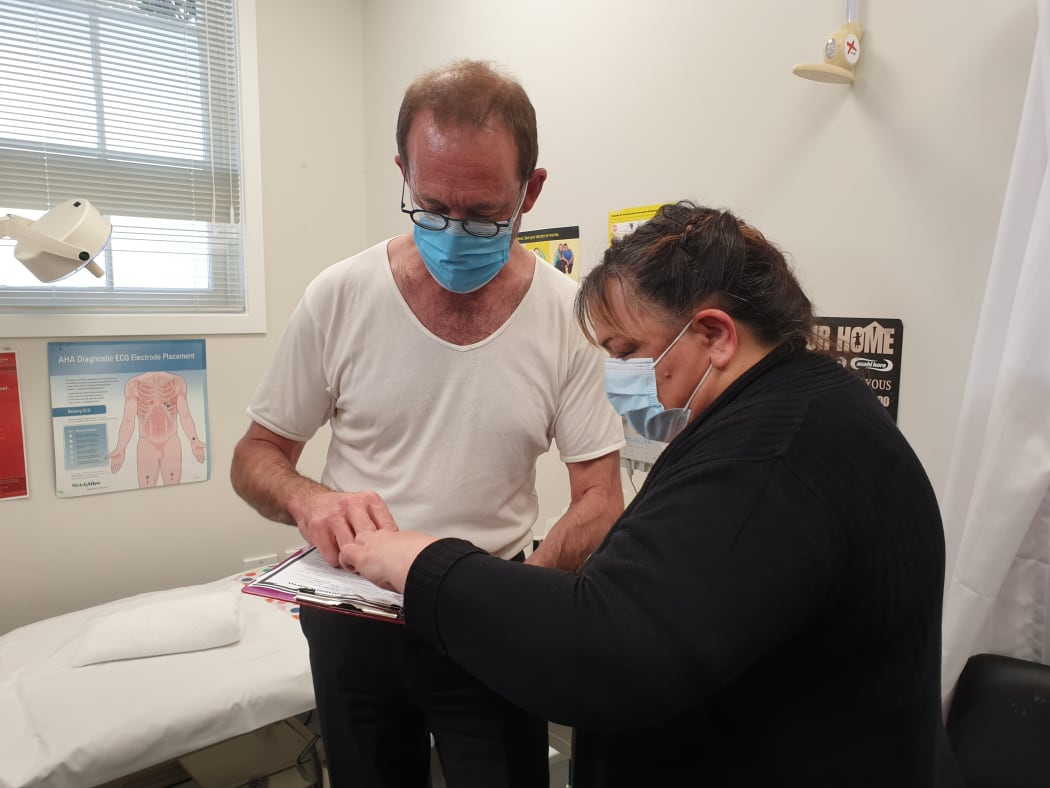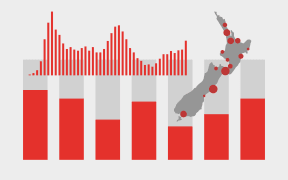The government has kicked off its flu vaccination campaign with the Minister of Health rolling up his sleeve.

Minister of Health Andrew Little preparing to receive his flu vaccine. Photo: RNZ / Tim Brown
Experts are warning this winter will the toughest since the pandemic started with potential for a secondary Covid-19 wave coinciding with the flu season.
That was why the government had secured 2 million doses of the flu vaccine and made it free for almost 40,000 additional people.
First up for a free jab at Te Kāika in Dunedin was Minister of Health Andrew Little, who was entitled to free flu vaccines due to his fight against cancer.
"I had prostate cancer about 13 years ago and recovered from that, and that entitles me to a free flu jab," he explained.
The government was acutely aware of how important this year's flu jab rollout was, as the country entered the uncertainty of its first flu season with Covid in widespread transmission.
"We know that there's a really high risk that we'll have both Covid and flu circulating at the same time and that's why we need to have maximum protection against a whole bunch of people getting sick at the same time," Little said.
The government was preparing for the possibility of the two waves colliding, he said.
"It is a possibility. We never knew when Omicron was going to hit us in the way that it has, we had hoped that it would be in the warmer months and that is what has happened. But the reality is Covid isn't going away and we don't know what's going to happen with Covid next we're always trying to follow what's happening in the rest of the world, but we have to expect that there'll be other outbreaks and other elevated levels of Covid infection."
The government had secured an additional 600,000 doses of the vaccine and widened free eligibility to all Māori and Pasifika aged 55 and over.
They were already free for people who were pregnant, over 65 or at risk of becoming seriously ill because of other underlying conditions.
Otago University epidemiologist Michael Baker said everyone who was eligible should get their flu vaccine.

Michael Baker. Photo:
"Anyone who's held off getting flu vaccine up to now, I think now's the year to get it just to boost your immunity coming into the flu season. And one of the other reasons is we know that if you get Covid-19 and you get influenza on top of that, you do have a higher risk of a poor outcome and dying," he said.
With New Zealand's border closed under Covid-19, the flu had essentially been eliminated here for the past two years.
With its return this winter might be rough, Professor Baker said.
"We should plan on this being a tough winter in terms of respiratory infections because we have not been through a winter yet with Covid-19 circulating widely and obviously combined with influenza, which we haven't had for two years, so - yes it's going to harder and it's going to harder also for our healthcare system."
Those in the health sector were already stretched and this winter the system could be overwhelmed.
But public health measures people were now used to, like mask-wearing and staying home when sick, combined with vaccination, would help minimise the risk of overwhelming the system, Baker said.
College of General Practitioners medical director Dr Bryan Betty said he was also concerned about what flu season might bring.
"New Zealand, I think, is particularly vulnerable because our borders were so closed we essentially had no flu in the country for the last two seasons. As a result of that we think our natural immunity is down, which means we are far more susceptible to a bad flu season this year than perhaps we normally would be."
Te Kāika Covid vaccination centre clinical manager Melanie Solia said they would be encouraging people to get their Covid boosters and to get tamariki up to date with other vaccinations when whānau came in for their flu jabs.
"Obviously our vulnerable populations are our target populations. We're trying to help Māori and Pacific Islanders, low-income families - we just do our best to reach out to them and give them the opportunity to make an informed choice."






